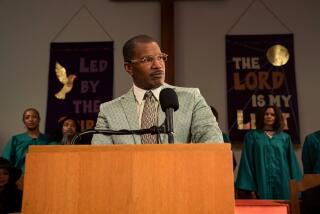It’s still tense in the jury room
- Share via
In some ways, Sidney Lumet’s “12 Angry Men” (1957), the beloved grandfather of the courtroom-drama genre, is already something of a relic.
For one thing, its tidy, idealized depiction of the American justice system seems like a product of a more naive time. For another, the makeup of its famously divided jury -- all male, all white, mostly middle-aged -- reflects the now glaring biases of the period. But the film, out this week in a 50th anniversary DVD, remains one of the more entertaining civics lessons Hollywood has produced, a simple but effective illustration of due process in action.
Originally a teleplay by Reginald Rose, “12 Angry Men” was first mounted as a live drama for CBS’ Studio One in 1954. Henry Fonda was the motivating force behind the movie adaptation; he and Rose served as producers, and Lumet, already an experienced TV director, was recruited for his first feature film.
The movie, which is confined almost entirely to the jury room, begins after closing arguments in the capital case of a teenager from the slums. The defendant, accused of killing his father, is barely glimpsed and the respective cases of the prosecution and the defense are heard only as they are debated by the jurors, who are identified simply by their juror numbers.
On the first ballot, the vote is 11-1 guilty. The lone holdout is Juror No. 8 (Fonda, once again the paragon of Everyman decency), who must explain the concept of reasonable doubt to the others, played by a murderer’s row of character actors (among them Lee J. Cobb, Martin Balsam, E.G. Marshall, Ed Begley, Jack Warden and Jack Klugman).
The live-TV origins are apparent in the no-frills setup, but Lumet’s economical direction smartly exploits the pressure-cooker atmosphere. As the director explained in his book “Making Movies,” he and his cinematographer, Boris Kaufman, shifted from high angles to low angles as the film progressed, to give the sense of space closing in as the deliberations intensify. (Lumet appears in the DVD’s making-of doc, one of two perfunctory featurettes; the other is a Court TV-ish segment on juries.)
On closer scrutiny, “12 Angry Men” is somewhat less clear-cut than its reputation suggests. The film might be intended as a celebration of American jurisprudence, but it reveals itself almost as the exception to the rule.
The implication is that without a heroic Juror No. 8 -- someone wise enough to see through the fallible witnesses and incompetent lawyers, and brave enough to take a stand against his rash and bigoted peers -- the jury process is doomed to failure.
Lumet, of course, went on to become one of the most insightful chroniclers of American social institutions (law and order are two of his great themes). But many of his later films are less rosy than “12 Angry Men,” with heroes who have been betrayed by the system or anti-heroes who represent the perversion of the system.
The film was a commercial disappointment on release but it earned an Oscar nomination for best picture and has since become a classroom staple. Somewhat contrived and a little mechanical, “12 Angry Men” is also a lucid demonstration of a deliberative process, and as such capable of illuminating subjects as diverse as civics, Aristotelian rhetoric and group psychology.
Its men-in-a-room template has proved endlessly adaptable. William Friedkin remade the film for Showtime in the late ‘90s, with a mixed-race (but still all-male) jury and the O.J. Simpson murder trial as a clear subtext. It has also struck a chord globally. In Japan, which has not had a jury system since the ‘40s, a 1991 version called “Gentle 12” inverted the premise: one juror convinces the others that the accused is guilty. A Russian adaptation, titled “12” and directed by the Oscar-winning Nikita Mikhalkov (“Burnt by the Sun”), uses the story to explore Russian-Chechen relations and premiered at the Venice Film Festival last year.
More to Read
Only good movies
Get the Indie Focus newsletter, Mark Olsen's weekly guide to the world of cinema.
You may occasionally receive promotional content from the Los Angeles Times.









